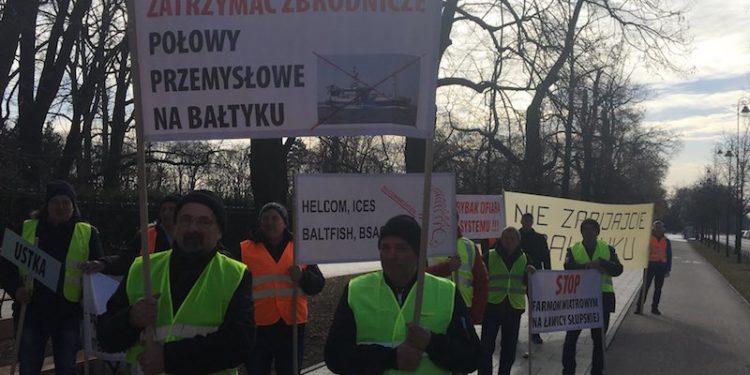Fishermen from Darłowo, Łeba, Ustka and the Puck Bay region on the Polish coast travelled to Warsaw last week to register their concern over the situation facing them in Baltic waters, making a fundamental demand for the protection of fish stocks and coastal ecosystems.
According to LIFE Platform’s Marcin Ruciński, the 500km trip to Warsaw was made by 200 Polish coastal fishermen, representing a fleet of around 650 <12 metre fishing vessels
The fishing fleet faces a number of issues, from the state of Baltic cod to the growing population of grey seals – but the key demand is for the protection of fish stocks and coastal ecosystems – habitats without which fish, fishing as a profession has no chance of survival.
‘Fishing for cod in the coastal zone has deteriorated drastically this year – many fishermen have not yet caught a single cod or only a few individuals, and this fish has traditionally been the basis of their existence,’ Marcin Ruciński said.
‘Although scientists also see this drastic problem in many respects, political decision-makers have not yet taken real action to give a chance to reverse the situation, despite proposals from, among others, LIFE. One of the basic and still unresolved problems indicated by fishermen is the availability of food for cod, sprat and to a lesser extent, herring. These are caught in Polish waters (and in the entire Central Baltic) by large pelagic vessels, mainly intended for fishmeal, an important component of many feeds. The closure of the 6-mile zone for these fisheries is insufficient for fishermen and they want them extended to the entire 12-mile zone.’
He said that as fisheries are managed to a large extent by the European Union, the protest had both regional and EU dimensions, and the shape of the new European Maritime and Fisheries Fund for 2021-2027 is a concern, not least the definition of small-scale fisheries, for which the European Commission offers particularly favourable financing conditions.
The concern is that there is support in the European Parliament for this definition to extend to vessels up to 24 metres, while LIFE and many other organisations are strongly in favour of retaining the current definition of small scale fisheries – boat length below 12 meters and using only passive fishing gear.
‘The problem for fishermen, especially small-scale fishermen, is also the fast-growing population of grey seals in the Baltic. Many of these very intelligent animals have specialised in using passive fishing gear as the proverbial "Swedish table". Large local significance, especially for protesters from the Puck Bay region, is attributed to the deteriorating ecological situation of its waters – caused by the level of pollution that has been growing in recent years,’ he said.
‘Along with the very bad cod situation and the impact of industrial pelagic fishing, all the above factors cause an existential threat to small-scale fisheries – not only in Poland but throughout the Central Baltic Sea.’
Marcin Ruciński said that the authorities in Warsaw responded to the protest constructively and with understanding.
‘Head of Chancellery of Poland’s Prime Minister, Michał Dworczyk went out to talk with the protesters. In addition, a delegation of protesting fishermen went to talks with the Minister of Maritime Economy and Inland Navigation Marek Gróbarczyk in the building of the Chancellery of the Prime Minister. The parties agreed on a preparation of a rescue programme for Polish small scale fisheries and the more proactive work of the administration in other aspects, including the enhanced protection of the 12-mile zone. Further negotiations and a meeting at the end of March are planned,’ he said.









